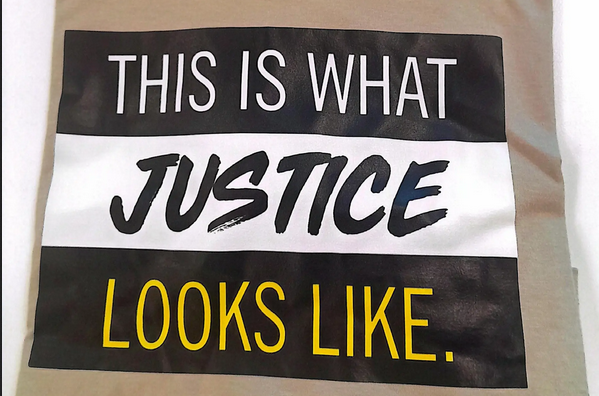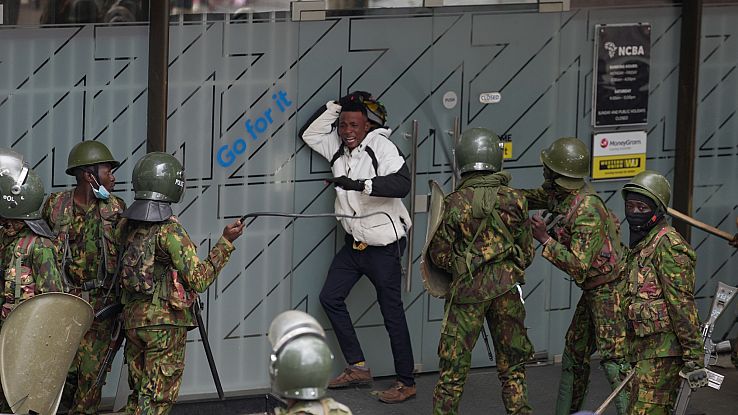Overview
This edition of the Amnesty Kenya Gazette comes at a time when the soul of our nation is being tested. In June, Kenyans stood up in their thousands—mourning lives lost in police custody, demanding justice for Gen Z victims, and resisting laws that threatened their privacy and dignity. From the tragic killing of Albert Ojwang to the brutal crackdown on peaceful protestors, we witnessed both the depths of state repression and the unrelenting courage of those who refuse to be silenced. Yet even amid grief and injustice, rays of hope emerged—charges dropped, rights defended, and dangerous clauses struck from law. This month, we honour the struggle, spotlight the wins, and reaffirm our collective power to stand up, speak out, and shape a more just and humane Kenya.
In this issue
- A Death in Custody
- Infiltration and the Cost of Police Inaction
- Progress in the Baby Pendo Murder Case
- Joint Call for Justice for Migrant Domestic Workers
- One Year On, from Mourning to Crackdown
- A Victory for Voices that Refuse to be Silenced
Watch
EPISODE 1 OF RIGHTOUS MADNESS
Same Script, Different Cast
A Death in Custody
June opened with a grave reminder of the dangers of unchecked police power: the death of Albert Ojwang, a teacher and blogger, under mysterious circumstances while in police custody on 7th June 2025. Police claimed Albert died by suicide in his cell, but a postmortem conducted by both independent and government pathologists ruled out self-harm, revealing blunt force trauma to the head, neck compression, and multiple soft tissue injuries—evidence pointing to torture and a cover-up. The incident echoed a disturbing pattern of custodial deaths and eroded public trust in the police.
Amnesty International Kenya immediately issued a statement demanding justice. We called for the arrest and prosecution of all involved officers, including Central Police OCS Samson Taalam, officers James Mukhwana, Peter Kimani, John Gitau, and two civilian remandees.
We also called for the recusal of Deputy Inspector General Eliud Lagat, who was the original complainant in Albert’s arrest—he has since stepped aside and recorded a statement with IPOA. We continue to urge IPOA to expedite thorough investigations into this murder. Albert’s death must not be another statistic; it must mark a turning point in the fight for police accountability in Kenya.
ACT NOW
JUSTICE FOR EUGINE
Eugine was an only child. He was killed during violent policing of a school unrest. He died in a place where he should have felt safe.
Infiltration and the Cost of Police Inaction
In the wake of Albert Ojwang’s custodial death, Kenyans across the country mobilized in peaceful protests demanding an end to police brutality and extrajudicial killings. In anticipation of these demonstrations, Amnesty International Kenya—under the Police Reforms Working Group—issued a public safety advisory to the National Police Service. Citing constitutional, legal, and regulatory frameworks, including three High Court rulings, the advisory reminded police of their obligation to uphold Article 37 of the Constitution, which guarantees the right to assemble and protest peacefully. It further emphasized the principle of command responsibility, urging that police commanders be held criminally liable for unlawful actions committed by officers under their command.
What began as a civic act of protest quickly descended into chaos after masked aggressors infiltrated the demonstrations and unleashed coordinated violence on protestors. Our monitoring confirmed that hundreds of attackers—armed with tyre whips, wooden batons, and knives—were mobilized, transported, and deployed across Nairobi’s streets as police stood by.
By day’s end, 25 people had been hospitalized, including five with gunshot wounds. Among them was Boniface Mwangi Kariuki, a bystander and mask vendor, shot at close range by police and later succumbing to his injuries two weeks later. While two police officers responsible for shooting Boniface have since been arrested and arraigned, authorities have yet to provide a public update on investigations into the organized violent groups. The right to protest must never be weaponized, undermined, or policed into fear.
ACT NOW
DEMAND A PUBLIC INQUIRY INTO THE JUNE 25TH SHOOTINGS IN PARLIAMENT
Join the 600+ Kenyans who have signed this petition, calling for justice and accountability
Progress in the Baby Pendo Murder Case
Nearly eight years after the brutal killing of Baby Samantha Pendo during the 2017 post-election violence, the wheels of justice are finally in motion. In a significant development, the High Court in Nairobi has set stringent bail conditions for the four police officers accused of her murder. Each officer has been granted cash bail of KES 1 million and must provide two sureties valued at KES 500,000. As part of the bail conditions, the officers are prohibited from visiting the Kisumu estates where the crimes were committed—specifically Nyalenda, Nyamasaria, Obunga, and Nyawita. They are also barred from contacting victims or witnesses, restricted from leaving the court’s jurisdiction, and required to attend all court proceedings.
Amnesty International Kenya continues to stand in unwavering solidarity with Baby Pendo’s family. As part of the legal team pursuing justice on their behalf, we affirm that accountability for police violence—especially when it claims the life of a child—must be full, fair, and unrelenting. This case is not only about Samantha Pendo’s right to life being cruelly denied; it is about affirming that no officer of the law is above the law. We will continue to monitor the proceedings closely and work alongside our partners to ensure that justice is served—not just in the courts, but in the hearts of a nation still grieving.

Amnesty Duka
Introducing Amnesty Duka — our brand-new online store where human rights meet style and purpose! From bold t-shirts to reusable water bottles, every item you purchase isn’t just cool merch — it’s a statement. All proceeds go directly to powering Amnesty Kenya’s work defending human rights across the country. Shop with purpose. Wear your values. Support the movement.
Click on the button below to visit our online store.

Joint Call for Justice for Migrant Domestic Workers
On 16th June 2025, marking International Domestic Workers Day, Amnesty International Kenya joined 12 other human rights organizations and trade unions in a powerful joint letter addressed to the Saudi Arabian Minister of Human Resources and Social Development. The letter called for urgent and concrete reforms to uphold the rights and dignity of over 4 million migrant domestic workers in the Kingdom—many of them African and Asian women working under isolating and abusive conditions. Despite their essential contribution to Saudi society and the delivery of Vision 2030, these women remain legally segregated and socially invisible.
The joint statement demands the Saudi government extend full labour law protections to domestic workers, enforce strict monitoring of working conditions, and abolish the deeply exploitative kafala system. While limited reforms have been made, most domestic workers still require employer permission to change jobs or leave the country—conditions that enable forced labour and systemic abuse. The letter further urges Saudi Arabia to ratify ILO Conventions 189 and 190 to guarantee legal protections and freedom from violence and harassment. We continue to stand with survivors and advocacy groups under the Send Us Home Kenya and Survivors Network Kenya coalitions, affirming that domestic workers deserve nothing less than dignity, accountability, and justice—no matter where they labour.
One Year On, from Mourning to Crackdown
June 25th, 2025 marked one year since the storming of Parliament and the tragic loss of over 60 young lives during the Gen Z protests of 2024. To honour the memory of their children, mothers and families of the victims organized a peaceful procession to Parliament, carrying the pain of unanswered questions and the weight of justice denied. Over twelve months since the protests that shook the conscience of the nation, not a single government official or security officer has been held accountable for the killings, maimings, and abductions that followed. What began as a solemn act of remembrance was again marred by violence. Police fired teargas at peaceful mourners and protestors, while violent agitators infiltrated the crowd, assaulted demonstrators, and looted businesses. Instead of addressing public concerns, the State responded with repression—shutting down media coverage and taking three broadcasters off air.

Amnesty International Kenya condemned the media blackout in the strongest terms and reminded the police of their duty to protect—not provoke—peaceful protestors. The situation further deteriorated when the Government described the commemorative protest as an “attempted coup,” with the Interior Cabinet Secretary going so far as to issue a chilling shoot-to-kill directive against any protestor seen approaching police stations or government buildings. The CS even pledged legal protection to officers who might be “persecuted” for carrying out the order. Such reckless utterances—at a time when public trust in the police is already shattered—only embolden trigger-happy officers and deepen the gulf between law enforcement and the public. The law is unequivocal: live ammunition may only be used to protect life, never property. We reject this dangerous rhetoric with the contempt it deserves. By the end of June 25th, the toll was devastating—19 dead, 531 injured, 15 enforced disappearances, 179 arrests, two reported cases of rape, two gang rapes, and one attempted rape. To worsen matters, the State has turned its hand against activists and human rights defenders, arresting them under the guise of cracking down on looters. We view this not as justice—but as intimidation aimed at silencing dissent. We will not be silenced.

A Victory for Voices that Refuse to Be Silenced
Even in the face of increasing repression, Kenyans continue to demonstrate the power of collective resistance and principled dissent. In a blatant attempt to intimidate critics of the Finance Bill 2025, the State arrested Rose Njeri—a young software engineer and coder—detaining her over the Madaraka Day weekend without legal representation or access to her advocates. Her arrest sent shockwaves across the tech and human rights communities, a stark reminder of the shrinking space for civic expression. But Kenyans refused to be silenced. Following widespread public outcry and legal pressure, the court dropped all charges against Rose and released her unconditionally.
In another hard-won victory, the controversial clause in the Finance Bill that would have granted the Kenya Revenue Authority (KRA) unrestricted access to private citizen data was dropped before the Bill was passed and assented to by the President. This outcome—one we had persistently advocated for alongside other civil society partners—reinforces a powerful truth: even under pressure, standing up for what is right can yield meaningful change. As we close this edition, we celebrate the resilience of everyday Kenyans who continue to speak out, show up, and shape a future where dignity, justice, and freedom are not just ideals—but lived realities.

